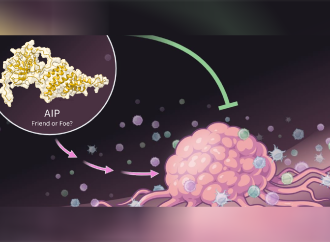
Advancing Cancer Research at the University of Malta through Molecular Exploration of the AIP Interactome
Cancer continues to be one of the most formidable health challenges worldwide, claiming countless lives despite significant scientific advances. As the quest for more effective diagnostics and treatments advances, the role of molecular biology in understanding the intricate mechanisms of cancer becomes increasingly vital. The University of Malta stands at the forefront of this effort, particularly through innovative research focusing on the arylhydrocarbon receptor-interacting protein (AIP) and its complex network of interactions within cells.
In a recent groundbreaking project, researchers at the University of Malta are delving into the molecular mechanisms underpinning cancer progression using high-throughput techniques. This initiative aims to decode how AIP and its interacting proteins influence tumor development, offering promising avenues for the identification of novel biomarkers and therapeutic targets.
Understanding the Role of AIP in Cancer Development and Progression
The AIP protein has traditionally been recognized for its tumor-suppressing role in the pituitary gland. However, emerging research reveals its dual nature—acting as a promoter in certain cancers such as colorectal and pancreatic cancers. This paradox underscores the complexity of molecular mechanisms in oncology, highlighting the necessity for detailed exploration of the AIP interactome.
Our research at the University of Malta focuses on unraveling the molecular pathways involving AIP. By understanding how AIP interacts with other proteins within the cell, scientists aim to delineate its functions as either a tumor suppressor or an oncogene, depending on the context. This knowledge is crucial for developing targeted therapies tailored to specific cancer types and stages.
Innovative Techniques in Molecular Oncology
The research employs cutting-edge methodologies such as RNA sequencing and mass spectrometry-based proteomics. These high-throughput techniques enable comprehensive profiling of gene expression and protein interactions, providing a detailed map of the AIP interactome. Such approaches facilitate the identification of crucial molecular signatures that might serve as diagnostic or prognostic biomarkers.
For instance, by analyzing the expression patterns of AIP and its partners, researchers can detect signatures associated with tumor progression or metastasis. This can lead to early detection strategies and personalized treatment plans, significantly improving patient outcomes.
The Significance of Molecular Signatures in Cancer Diagnosis and Prognosis
Biomarkers derived from the molecular signature within the AIP interactome hold great potential for clinical application. These molecular signs can assist in accurate cancer staging, predicting metastatic potential, and monitoring treatment responses. The ability to categorize cancers based on their molecular profiles paves the way for precision medicine—tailoring interventions to the individual patient’s tumor biology.
This project aims to identify a set of molecular markers that can be validated for use in clinical settings, informing treatment decisions and improving prognosis accuracy. Such advancements could revolutionize cancer diagnostics, making them more precise and less invasive.
Collaborative Efforts and Future Directions
The research is led by Prof. Therese Hunter and Prof. Gary J. Hunter from the Department of Physiology and Biochemistry at the University of Malta. Their team collaborates with international partners and has presented preliminary findings at prestigious scientific meetings such as the MOSBRI 4th Scientific Meeting in Paris. These efforts not only advance scientific understanding but also foster international collaborations, expanding the impact of this research.
Funding from the Cancer Research and Innovation Hub Malta (CRIHM) supports this three-year project, highlighting Malta’s commitment to contributing meaningful insights into cancer biology. The project’s findings have the potential to influence future therapeutic strategies and diagnostic tools, positioning the University of Malta as a key player in molecular oncology.
How This Research Benefits the Broader Community
Beyond academic advancements, this research has broader implications for public health. Developing reliable biomarkers can lead to earlier detection of cancers, improved treatment efficacy, and reduced mortality rates. Moreover, understanding molecular mechanisms assists in discovering targeted therapies with fewer side effects, enhancing patient quality of life.
If you are interested in the latest developments in cancer research or looking to participate in innovative healthcare solutions, exploring academic opportunities at the University of Malta can be a meaningful step. Submit your application today and become part of groundbreaking research efforts.
Get Involved and Stay Updated on Cancer Research
The University of Malta actively promotes scientific exchange through conferences, seminars, and workshops. Stay informed about upcoming events in oncology and molecular biology by visiting their events page. Engaging with these initiatives offers valuable insights into ongoing research and future trends in cancer diagnostics and therapy.
For educators, students, and researchers passionate about molecular oncology, collaborating with the University of Malta can open doors to innovative projects and shared knowledge. Discover the potentials of the AIP interactome and contribute to combating one of humanity’s most pressing health issues.
Conclusion: Pioneering Cancer Diagnostics at the University of Malta
The molecular exploration of the AIP interactome exemplifies how advanced research can lead to meaningful clinical applications. The University of Malta’s dedicated scientists are making significant strides in understanding the complex biology of cancer, offering hope for more effective diagnostics and personalized treatments in the future.
To learn more about ongoing research, academic programs, or collaboration opportunities, visit the Research & Projects section of the University of Malta. Join the fight against cancer by supporting, studying, or contributing to these pioneering efforts.
Explore further our commitment to research excellence and see how Malta’s university is making a global impact in molecular oncology.

